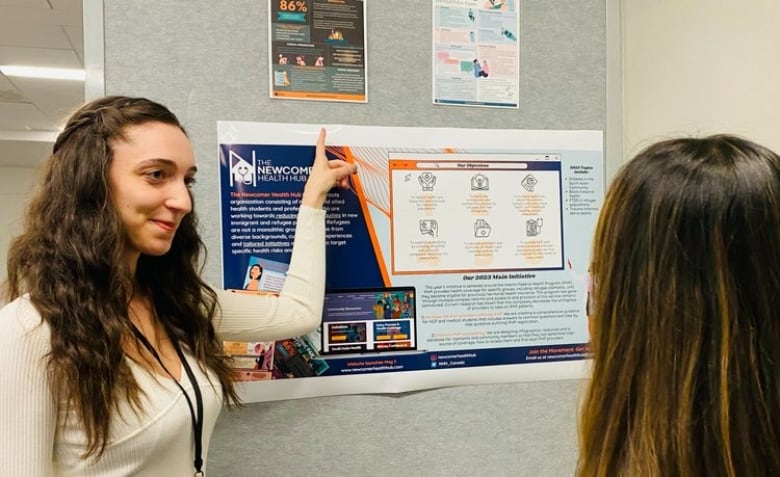Three medical students at Western University’s Schulich School of Medicine and Dentistry have started an online resource center that provides culturally-specific health information for newcomers and refugees to Canada.
The Newcomer Health Hub (NHH) educates community members and frontline health care workers on how to treat the complex health challenges newcomers may have, using evidence-based information tailored to their unique needs.
Third-year students, Lotus Alphonsus, Theshani De Silva, and Penelope Neocleous started NHH to advocate for and empower newcomers to take control of their own health.
“In medical schools, refugees are treated as one group and what we’ve noticed is that certain communities have certain issues and traumas they’ve experienced,” Alphonsus said.
“Without having that background and knowing what you should be asking, it’s really hard to help give holistic care, especially to these communities who aren’t used to advocating for themselves or knowing that they can.”
They’ve created infographics focusing on how conflicts around the world impact immigrants, refugees, LGBTQ+, South Asian, African, Caribbean, and Black communities respectively. They also share knowledge around mental health, and sexual and reproductive health.
Goals to bridge the gaps

The trio’s passion to bridge the gaps within the system came from their shared backgrounds as children of refugee parents who struggled to get the care they needed.
“Access to resources was not always optimal and as soon as I was old enough, I was attending appointments with my parents to help them understand the system better,” De Silva said.
De Silva had a relative who was diagnosed with a disease that could’ve been prevented had she gotten the right information and proactive care, she recalled.
The group believes there’s a lack of knowledge in health care when it comes to treating diverse communities. The information that is available tends to group all Canadians as one, they said.
“If you come from a diverse community, you realize what the specific needs of your community are and how it differs from others. For example, female genital mutilation isn’t something typical of Canadian faces, so we don’t focus on that as much ,” Alphonsus said.
NHH explores certain conditions that different ethnic groups may be higher risk for, and suggests modifications that still fit their cultural expectations. They also translate their content in different languages and simplify the insurance coverage process.

Since launching in May, the group said they’ve had medical students from across Canada reach out to them with similar concerns about these topics not being in the curriculum.
NHH has received about $10,000 in funding from federal and provincial grants, along with private funding, Neocleous said.
“It was through creating these infographics that we learned about ourselves, so its helping us learn some of the patterns that aren’t very helpful for the community and also educate ourselves on how diverse the needs are,” Alphonsus added.
The trio hopes to become a multidisciplinary hub that involves nurses, pharmacists, social workers, and lawyers to tackle the issue from a holistic lens. Their next steps are improving the Interim Federal Health Program, which is temporary health coverage refugees get when they come to Canada and clarifying how it works.
“It gives me a lot of hope that the future generation is going to become these culturally competent physicians and make sure future refugees don’t have to go through what our families went through,” Neocleous said.
